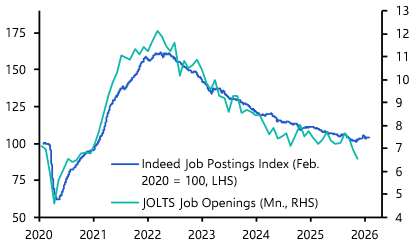The euro-zone economy is heading for a deep and protracted recession – but it’s one that won’t stop the European Central Bank from continuing to raise interest rates.
Our Euro-zone Economics team also warns in its latest quarterly Outlook that, rather than shrinking its balance sheet, the Bank will likely be forced to restart net asset purchases in order to contain rising of peripheral bond yields.
The team’s report, which was written by Andrew Kenningham, Jack Allen-Reynolds, Jessica Hinds, Franziska Palmas and Anna Padt, lays bare the impact of high energy prices and rising interest rates on the euro-zone’s households and businesses. It shows how Dutch households are most exposed by their high debt burdens but also explains why Germany is likely to face the steepest downturn of any major euro-zone economy.
Although the recession could be relatively mild compared to previous downturns, and begins with the euro-zone labour market in relatively good shape, the report also notes that the ECB won’t let up its war on inflation.
Headline rates may fall next year, but high and rising core inflation will prompt further rate hikes, which will in turn likely require the use of the Transmission Protection Instrument to contain the fall-out in the bond market.
Download our Euro-zone Outlook report today to find out how long and deep the recession will be – and how far the ECB will raise rates in order to tackle inflation



